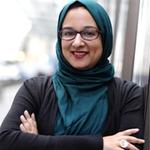Yemen is Facing a Massive Famine Crisis – We're Teaming Up with Islamic Relief USA to Help
Community
|
Apr 27, 2022
|
3 MIN READ

Two Yemeni children at a Hodeiba health facility in 2021; image source: Islamic Relief USA
With Ramadan nearing its end, you’ve probably been inundated with numerous pleas to support a variety of charitable causes, campaigns and organizations. Haute Hijab has worked with a variety of organizations in the past to help raise money (with your help) in the last days of Ramadan, and this year we are proud to partner with Islamic Relief USA on their Yemen Emergency Appeal campaign.
From Thursday through Sunday (April 28-May 1, 2022), a portion of the proceeds from your HH purchases will be donated to IRUSA’s ongoing campaign to help alleviate the terrible food insecurity affecting millions of Yemenis. Years of conflict in Yemen has led to one of the world’s worst humanitarian crises with widespread hunger, illness and disease. According to IRUSA’s website, more than “20 million people are in need of dire humanitarian assistance, including almost 13 million children,” and “economic collapse and the destruction of health, education and other critical systems has trapped Yemenis in a cycle of poverty.”
The facts and figures out of Yemen are astounding, and not in a good way. Widespread famine has made living in Yemen untenable for families. According to IRUSA’s Yemen case study:
- About 1.8 million children in Yemen are suffering from acute malnutrition.
- 400,000 on any given day are suffering from a life-threatening form of severe acute malnutrition.
- About 50 percent of Yemeni children under the age of five are chronically malnourished.
- In addition to this, two million Yemeni children are out of school.
- A total of two million children are internally displaced due to the years and years of ongoing war.

A young boy in Yemen; image source: IRUSA, 2021
When you’re faced with numbers like these and read the stories coming out of Yemen, how can we not be compelled to help in whatever way possible?
IRUSA is working with Islamic Relief Worldwide (IRW), which has nine offices in Yemen, to help with various projects in the country. I spoke with Barbara Gallets, the senior international programs coordinator for Middle East and North Africa with Islamic Relief USA, about how IRUSA works with IRW to help Yemenis.
Currently IRUSA is actively funding six projects in Yemen: a Ramadan campaign, a food assistance project, two WASH (water, sanitation and hygiene) projects, a health project that ends on April 30th and “one livelihood project that is focusing on apprenticeship for youth to provide income generation and skill building,” says Barbara.
The food assistance comes in two forms – food parcels or unconditional cash to buy basic needs, like various food and hygiene items, Barbara says.
I was curious to learn more about what goes into the food parcels and what the “unconditional cash” program constitutes. When we donate to programs like these, what do people in need specifically receive? Barbara told me that the cash program’s purpose is to help families buy specifically what they need and alleviate the stress of debt. “The family physically receives the equivalent of 90 dollars per month for six months. There is a verification process – there is a needs assessment that is done and criteria that is established before the project begins.
“The [United Nations] cluster system working around food security will have information they provide and verify that the families who have applied do qualify for the program,” she says. Specifically they look for families with female heads of households, orphan households, the elderly, those with disabilities – the most vulnerable – “and most Yemenis fall in this category,” Barbara tells me.

A young Yemeni girl; image source: IRUSA, 2021
The food parcels have a set list of items based on the Yemeni diet to help cover caloric needs, she says, while vouchers help them redeem items like eggs and fresh dairy, which can’t be included in food parcels that have non perishable items assembled ahead of time.
I was taken aback by the amount Barbara told me – 90 dollars to cover a family’s various food and hygiene needs per month (for a six month period). It made me think of what my weekly (forget monthly) grocery bills are, how much unnecessary spending I do and how many people I can help with that money.
We’re so grateful for the opportunity to partner with IRUSA to help in whatever way possible. We will be donating a portion of the proceeds from all sales that happen between Thursday and the end of Ramadan to IRUSA’s campaign in Yemen. Let’s all do whatever we can in these last blessed days of Ramadan to help those in desperate need.
Subscribe to be the first to know about new product releases, styling ideas and more.
What products are you interested in?

